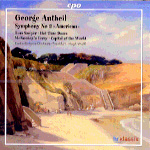So-called “bad boy” composer George Antheil had a peculiar way of absorbing every music style he encountered, and then inserting it–not always fully digested–into his own work. Thus, at any moment you’re likely to encounter “raw” Shostakovich (a particularly pervasive influence on Antheil) as well as Copland. In fact, you can hear both juxtaposed in the Tom Sawyer Overture, which alternates between the Soviet composer’s trademark comedic galloping and Copland’s Cowboy sauntering (à la Billy the Kid). This frenzied trotting is a persistent feature in Antheil’s work, constituting the bulk of the McKonkey’s Ferry Overture, the Hot Time Dance, and the opening movement of Capitol of the World suite (though here it’s fit into triple meter). The following Meditation movement forms one of the few moments of relative calm on this frenetic program, which ends with the jazzily barbaric Knife Fight.
Antheil set an ambitious goal with his “American” Symphony, setting out to portray in music “the America of the future, bold, fearless, new, and coming from the very breadth of the new continent.” Indeed the music is forward looking in the composer’s use of modern (for 1939) harmony and complex jazz-derived rhythms, and in his signature brash and “un-polite” orchestration. Unlike the aforementioned works with their nods to Copland, here there’s precious little use of American thematic archetypes; rather Antheil attempts–and largely manages, all on his own–to capture the spirit of a vibrant nation.
Conductor Hugh Wolff is thoroughly steeped in the composer’s sound-world, and he leads the Frankfurt Radio Symphony in highly idiomatic, virtuoso performances (the brass and winds are magnificent) that make a strong case for including Antheil in the American symphonic pantheon alongside the likes of Ives, Piston, Harris, and Schuman. CPO’s spacious recording presents the music with persuasive impact. An intriguing disc, indispensable for collectors of American music. [2/5/2005]
































